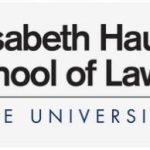Tulane University School of Law was established in 1847, making it the 12th oldest law school in the United States. The school was founded by a group of prominent New Orleans lawyers, who wanted to create a law school that would provide an education in both civil and common law. Initially, Tulane Law was located at the corner of Common and Gravier Streets in downtown New Orleans. In 1893, Tulane Law moved to its current location on the uptown campus of Tulane University. Over the years, Tulane Law has grown and developed significantly. The faculty now numbers over 100 full-time professors and adjunct lecturers, and student enrollment has grown from just under 300 students to more than 1,400. In addition to offering several joint degree programs with other schools within Tulane University, the School of Law offers an extensive selection of courses designed to meet the needs of a diverse student body. As part of its commitment to providing an outstanding legal education, Tulane Law also offers various clinical programs that allow students to gain practical experience while in law school. These clinical programs give students the opportunity to work closely with experienced attorneys on real cases as well as participate in pro bono activities within their communities.
Tulane University School of Law is located in the state of Louisiana. As one of the leading law programs, Tulane University School of Law has a high average LSAT score of 160-164 when recruiting new students. As a return, the median starting salary for law graduates reaches $90,000 per year. See the following table for detailed admissions information and career profiles of Tulane University School of Law.
Admissions: Tulane University
Tulane University School of Law is a top-tier law school located in New Orleans, Louisiana. The school boasts an impressive admissions rate of approximately 23% with an average LSAT score of 168. In the 2019-2020 academic year, the incoming class had a median GPA of 3.68 and a median LSAT score of 167. The admissions office also considers extracurricular activities, work experience, and personal essays as part of their evaluation process. Additionally, Tulane values diversity among its student body and encourages applicants from all backgrounds to apply for admission. In the 2019-2020 academic year, Tulane’s incoming class was made up of students from 28 countries around the world and represented 52 different undergraduate institutions across the United States. With such an esteemed faculty and diverse student population, Tulane University School of Law is a great choice for aspiring attorneys looking to pursue a legal education in an exciting city like New Orleans.
| Fall 2019 Admissions and Enrollment Statistics | |
|---|---|
| Total number of full- and part-time applicants | 2,990 |
| Total number of full- and part-time acceptances | 894 |
| Overall acceptance rate | 29.9% |
| Total number of full- and part-time first-year students enrolled | 284 |
| Number of full-time program applicants | 2,990 |
| Number of full-time program acceptances | 894 |
| Full-time acceptance rate | 29.9% |
| Number of first-year full-time students enrolled | 284 |
| Number of part-time program applicants | 0 |
| Number of part-time program acceptances | 0 |
| Part-time acceptance rate | N/A |
| Number of first-year part-time students enrolled | 0 |
| Fall 2019 GPA and LSAT Scores | |
| 25th-75th percentile GPA scores for all students | 3.34-3.75 |
| 25th-75th percentile LSAT scores for all students | 160-164 |
| 25th-75th percentile undergraduate GPA for full-time students | 3.34-3.75 |
| 25th-75th percentile LSAT scores for full-time students | 160-164 |
| 25th-75th percentile undergraduate GPA for part-time students | N/A |
| 25th-75th percentile LSAT scores for part-time students | N/A |
Careers: Tulane University
| Bar Statistics (Winter and Summer 2018 administrations) | |
|---|---|
| State where the greatest number of first-time test takers took the bar | LA |
| School’s bar passage rate for first-time test takers | 75.9% |
| Statewide bar passage rate for first-time test takers | 65.5% |
| Class of 2018 Graduates | |
| Total graduates | 242 |
| Graduates employed at graduation | 70.7% |
| Graduates known to be employed nine months after graduation | 91.1% |
| Starting Salaries of 2018 Graduates Employed Full-time | |
| 25th percentile private sector starting salary | $70,000 |
| Median private sector starting salary | $90,000 |
| 75th percentile private sector starting salary | $145,000 |
| Percent in the private sector who reported salary information | 72% |
| Median public service starting salary | $38,000 |
| Areas of Legal Practice (Class of 2018) | |
| Percent employed in academia | 2.0% |
| Percent employed in business and industry | 10.0% |
| Percent employed in government | 10.0% |
| Percent employed in all judicial clerkships | 12.0% |
| Percent employed in law firms | 57.0% |
| Percent employed in public interest | 9.0% |
| Percent employed in an unknown field | 0.0% |
| Percent employed in a judicial clerkship by an Article III federal judge | 5.4% |
| 2018 Graduates Employment Location | |
| Graduates employed in-state | 38% |
| Graduates employed in foreign countries | 2% |
| Number of states where graduates are employed | 32 |
| New England (CT, ME, MA, NH, RI, VT) | 2.0% |
| Middle Atlantic (NY, NJ, PA) | 12.0% |
| East North Central (IL, IN, MI, OH, WI) | 3.0% |
| West North Central (IA, KS, MN, MO, NE, ND, SD) | 3.0% |
| South Atlantic (DE, DC, FL, GA, MD, NC, SC, VA, WV) | 16.0% |
| East South Central (AL, KY, MS, TN) | 3.0% |
| West South Central (AR, LA, OK, TX) | 47.0% |
| Pacific (AK, CA, HI, OR, WA) | 8.0% |
| Mountain (AZ, CO, ID, MT, NV, NM, UT, WY) | 3.0% |
| Employment location unknown | 1.0% |
| Career Services | |
| (Data appear as originally submitted by this school) | |
| Career services operations | Extensive individual counseling, employer development, programs on job search skills and practice areas. Interview programs on- and off-campus. Areas of expertise include judicial clerkships, fellowships, government employment, international opportunities, alternatives to traditional practice, environmental law, and numerous private sector areas. |
| Job Type | |
| Bar admission required or anticipated (e.g., attorney and corporate counsel positions, law clerks, judicial clerks) | 92.0% |
| J.D. preferred, law degree enhances position (e.g., corporate contracts administrator, alternative dispute resolution specialist, government regulatory analyst, FBI special agent) | 3.0% |
| Professional/other (jobs that require professional skills or training but for which a J.D. is neither preferred nor particularly applicable; e.g., accountant, teacher, business manager, nurse) | 4.0% |
| Nonprofessional/other (job that does not require any professional skills or training or is taken on a temporary basis and not viewed as part of a career path) | 1.0% |









